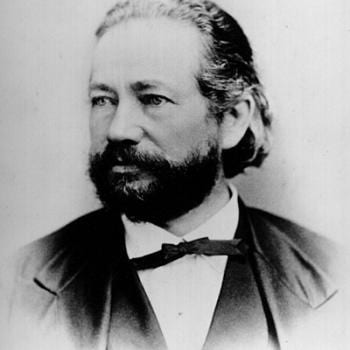
Jonathan Leeman was recently on the Defend and Confirm podcast. The guys (Sean DeMars and Russell Berger) at D&C have been doing a series on critical theories, which I commend to you (especially for the uninitiated listener wanting an introduction to the relevant concepts). The Leeman interview is a bit of an interruption of said series but is, nevertheless, not totally off topic. The discussion between Leeman and the D&C hosts revolves around how Christians should engage with one another when divided by either political opinions or, and perhaps especially, the new question of how critical race theory (CRT) should be handled by Christians.
The interview is framed by the tongue-in-cheek question of whether or not Leeman himself or 9Marks is drunk on the woke/Marxist cool-aid (the obvious, implied answer being in the negative, but apparently the discernment blogger brigade doesn’t agree). I won’t recount the whole, hour-long talk here, but I do want to riff on one point.
Let me make clear at the outset, I don’t believe that Leeman is a critical theorist or any other kind of Marxist (classical, western, existentialist, or otherwise) or postmodernist. In the podcast, Leeman admits that, while he has some familiarity with Foucault and Derrida (both of whom are relevant for contemporary critical theories), he has read only one book on CRT (based on the citations in his T4G talk this would be Richard Delgado’s introductory CRT text), so he’s unlikely to be a CRT’er either, or at least not a very good one (n.b. critical theory and CRT not being synonymous but rather related). I have profited from some of Leeman’s work, especially his book Political Church— even though he and I would disagree on the sphere sovereignty organization he clings to, and which I reject (if not wholesale) as somewhat inconsistent with the Reformed tradition. Leeman is thoughtful and, often (just not in this case), helpful. 9Marks, from what I can tell, is a good organization, and reading Mark Dever’s books early on sparked an enduring interest in ecclesiology for me (though I arrive at different conclusions from him as well). But on the subject at hand, Leeman has been, well, a bit squishy, as I like to say.
Where I find instability in Leeman’s treatment of these issues, however, is in a less CRT-substantive area, if you will. Rather it is with his initial approach to CRT and any sub-alternate mechanisms like intersectionality that I take issue— it is also my contention that intersectionality cannot be properly discussed detached from CRT; that it, as a mid-level theory, cannot exist outside thereof. (I have argued the case of the latter point elsewhere.)
Leeman is not the only one approaching critical social theories in the way that I describe below, but he is, perhaps, the best-known representative of this style and will, therefore, serve as our avatar (or, maybe, piñata) of the approach, attitude, etc. discussed here.
About 20 minutes into the podcast, Leeman’s T4G breakout session talk is referenced wherein he refers to identity politics as an “unexpected ally.” Now, identity politics is much broader a subject than CRT. At times in his talk, Leeman erroneously conflates identity politics and CRT. But in the D&C episode, the the hosts and Leeman zero in on intersectionality in particular.
In the interview Leeman admits that, in hindsight, he would have chosen a less politically loaded word than “allyship,” but that he nevertheless stands by the substance of his speech. He is then asked, for the sake clarity, to elaborate what he means by the suggestion that intersectionality, for example, is an ally.
“What are the shared goals [Christians] have with intersectionality? Oppose oppression, oppose abuse. And that’s about it.” First, recalling my previous characterization of intersectionality, this is comment by Leeman is a bit confused. Properly speaking, the purpose of intersectionality isn’t to oppose oppression, but rather to enable the critical race theorist to discern the interaction of myriad sites of oppression along the matrix of domination. More broadly speaking, CRT is certainly interested in alleviating oppression (and this in a specific way).
Second, Leeman acknowledges that critical race theorists would, of course, define oppression differently. But he then continues to claim a place for co-belligerence. “There’s a place for co-belligerence in fight abortion with a Muslim. There’s a place for co-belligernece in fighting pornography with a feminist.”
He adds the historical example of allying with the Communists to fight Nazism.
Russell rightly notes at this point that the version of “intersectionality” affirmed by Leeman as an ally is, once Leeman has inserted all the necessary caveats, not much more than a hollow shell of intersectionality. I would concur and add that no critical race theorist would recognize the version of intersectionality on offer from Leeman. They would likely criticize him for emaciating it, de-radicalizing it, stripping it of its transformative (and political) power. (I say this because theorists like Barbara Tomlinson have chastized feminists for similar moves.) In the end, actual intersectionality necessarily implies/contains, inter alia, different value judgments, assumptions, and political ambitions than Christians would (or should) be comfortable with. (I have written more fully about this elsewhere.)
The same thing could be said about “equity.” Christians and critical race theorists may agree that equity is a desirable goal/value, worthy of pursuit. This may appear like an occasion for co-belligerence, except that the two parties (assuming a traditional Christian understanding of the concept) stand in stark disagreement about what they are, in fact, pursuing. Christians (generally speaking) approach the table with an understanding of justice that is something akin to the classical conception (i.e. affording each man his due) and ultimately situated within God’s revelation (as a reflection of God’s own perfect character) as the ultimate standard of justice, righteousness, etc. Equity would fit into this basic framework and refer to something like general fairness (controlling for the evident limitations of lapsarian man’s judgment).
CRT’ers, on the other hand, have reformulated “equity” to means more or less equality of outcome controlled for past injustices and discrimination. This requires, as Ibram Kendi never tires of saying, present discrimination (unto equity) for the sake of remedying past discrimination (and future discrimination for the presumptive present discrimination). Discrimination as such is not evil to Kendi and other CRT-informed thinkers. The question is whether discrimination is in the service of equity, that is, promoting the interests of oppressed persons (as defined within the CRT paradigm) over and against the existing systems of domination. By contrast, Christians would usually argue that discrimination, by definition, is inequitable. The difference between the two outlooks could not be more stark. “Allyship,” then, does not truly extend even to semantic agreement.
Returning to the T4G speech by Leeman: I would strongly urge Leeman and anyone else who wants to comment on CRT and related ideas– especially if the speaker enjoys a sizable audience like Leeman deservedly does– to read the material, thoroughly! In the case of intersectionality, Leeman could have gotten away with reading the trio of Crenshaw articles and, perhaps, a couple of books by Patricia Hill Collins or Barbara Tomlinson. Nothing too strenuous (though admittedly boring). And luckily, the three authors just mentioned do not pride themselves on penning impenetrable prose as so many critical social theorists seem to. The point is that at least on this narrow topic, it is relatively easy to get up to speed (though, for true competency, a good dose of CRT texts beyond Delgado would be required to position intersectionality properly within the broader theory to which it belongs). Leeman did not do this, by his own admission (unless I’m not understanding his earlier comment in the podcast), and it showed.
Even more glaring is his, admittedly brief, comment on white fragility toward the end of his T4G speech wherein he casts it as simply synonymous with the sin of pride.
Maybe you’ve heard of the book White Fragility which talks about the fact that white folk can have fragile egos and can’t take criticism around the topic of race. What is that? That’s good old fashioned defensiveness. It’s pride.
This is woefully inaccurate, and Leeman himself, in the podcast, says that misrepresentation of ideas (intentional or otherwise) is sinful. I, myself, would not say that Leeman was sinful in his misunderstanding of Robin DiAngelo’s signature contribution to critical whiteness studies, just negligent. He admits in the podcast that he has never read DiAngelo’s bestseller, White Fragility. He has only read book reviews. This is a problem. Without diving into DiAngelo’s work, suffice it to say that her central claim is not that white people “can have fragile egos and can’t take criticism around the topic of race,” as Leeman put it (emphasis added). Rather it is that all white people in western society (which is a racialized society) necessarily are intellectually and emotionally fragile because they lack the stamina required for discussing race, and, more importantly, benefit from the status quo (and, so, do not want to engage in meaningful change). The effect of this white hypersensitivity is that white dominance is perpetuated. Furthermore, the evidence of white fragility in action, per DiAngelo, is everything from whites requesting evidence or explanations of alleged racist behavior (in themselves or others) (this is “epistemic violence”), to the establishment of conversational procedural norms like being respectful. Such rules serve no purpose other than to “obscure racism, protect white dominance, and regain white equilibrium.”
My friend, Neil Shenvi, has explained this whole dynamic perfectly:
The white person seems to have been placed into an impossible situation: he can either admit that he is racist and fragile. Or he can demonstrate that he is racist and fragile by denying that he is racist and fragile.
(Also, look for Jonathan Church’s forthcoming book critiquing white fragility.)
What DiAngelo describes is not pride. If someone is accused of a high crime like murder (or racism, for that matter), and believe themselves to be falsely accused, the natural response is resistance. But this is objectionable (indeed, racist) to DiAngelo. Why? Because her theory carries with it the presumptions of the discipline from which it springs, CRT (or, more specifically, critical whiteness studies), viz., 1) that racism is ordinary, ubiquitous, and permanent, 2) that the status quo is that of white domination, and 3) that all white people are necessarily complicit in this white supremacist system. And so, to DiAngelo, it is (as a white person) prideful and dishonest to recoil at the accusation of racism because she knows you are guilty. As DiAngelo is fond of saying, “The question is not, ‘Did racism take place?’ but rather, ‘How did racism manifest in that situation?'” Intent is also irrelevant. Impact is all. None of this is to say that someone (regardless of skin color) could be overly sensitive to discussing things surrounding race (especially in the present political climate). It is obviously within the realm of possibility that a white person could employ some of the tactics mentioned by DiAngelo in her book (e.g. changing the subject, crying, etc.) to avoid the issue or even deflect from a legitimate accusation of genuinely racist behavior. But that’t not the point. Rightly understood, white fragility assumes, as a matter of course, that a posture of avoidance and a literal mental and emotional handicap–we used to call this racist– is inherent in, and instinctual to, all white people when it comes to talking about race. Why do they do this? Because they– and DiAngelo, like many CRT’ers, presents this in an almost Darwinian conception of adaptation– want to preserve their power, a decidedly insidious motive.
I could go on, but hopefully the above is sufficient to show the problems with Leeman’s characterization of white fragility. Not everyone should be subjected to reading DiAngelo’s drivel (which is really just a regurgitation of her dissertation and subsequent articles). DiAngelo is, in my opinion, simply an unimpressive thinker. She has had one idea and has capitalized off of it for her entire career. She now rakes in millions of dollars for indoctrinating people in it. DiAnelgo’s thought does not even constitute the best of critical theories. As wild as they were, the Frankfurt Schoolers tower above her in terms of sheer intellect and imagination. But it is the simple, explosive ideas that often captivate popular discourse.
That being said, Leeman should have read DiAngelo’s book (which, per the Amazon bestseller list, apparently everyone is) before publicly commenting on it. It is no wonder that his representation of her ideas are skewed. DiAngelo is not worried about pride in the Christian sense. She is certainly concerned with white pride which feeds the intellectual and emotional fragility of white people by way of their lifelong submersion in white systems of domination. But that is not how Leeman used the term, “white fragility.”
Leeman’s use of this and other concepts like intersectionality represents a strange bent amongst certain evangelical thought leaders which seems to extend only to the range of ideas now on offer in the race and racism department (primarily if not exclusively supplied by critical social theories at this point). It is a bent or impulse to rehabilitate the concepts and framework to serve Christian needs, as if our theology was too inept to perform the task adequately on its own. Rehabilitation efforts are problematic for this reason, but also because, at some point, any Christianization of the terms and concepts in question effectively destroy the original character and purpose of said terms and concepts (contra the intent of the authors). This, in my mind, is a version of dishonest intellectual commandeering. Shifting the meaning of an idea like white fragility, either re-purposing it for Christian ends or by providing it a Christianized interpretation, also confuses Christian discourse with the outside world. Unfortunately, we are not consulted on these things; we aren’t at the helm of popular understanding. I have made this same basic argument before regarding the phrase “Black Lives Matter” and “reproductive justice.”
Confessional Christians demand precision and consistency with authorial intent when dealing with the historic creeds to which we subscribe. Most conservatives pledge fealty to some sort of textualist/originalist interpretation of the Constitution for similar reasons. All I am saying is that the same standard should be applied to our interaction with CRT and the like. It is our job to honestly and precisely interpret the intended meaning of people like Crenshaw and DiAngelo and represent them accordingly. We cannot drain and then refill their concepts with our own content for the sake of easing the awkwardness of our discourse (from the mainstream culture’s perspective) on matters of racial relations in America. That is lazy, confusing, and dishonest (and not the motive or exact maneuver I am accusing Leeman of).
At one point in the D&C podcast, Russell seems to be hinting at something like what I have just droned on about for but the natural flow of the discussion goes elsewhere. I wish that line of thought would have been pursued to see how Leeman would respond.
All of that to say, Leeman’s case for co-belligerence between Christians and the practitioners of certain ideology drawn from CRT falls flat. In the end, because of the conceptual disagreements between the two parties (which Leeman fails to fully recognize), it would be a bit like (to borrow one of his own examples) Christians and feminists teaming up to combat “pornography” but then realizing that neither party could agree on how to define pornography. Maybe the feminists meant to outlaw only voyeuristic pornography because their guiding value is consent and the bodily agency of the woman. The belief of the feminists, in this hypothetical, is that “pornography” refers to any and all subjugation of women and, therefore, complimentarian marriages are just as problematic as voyeurism (even though Christians might be against the latter as well). The issue for the feminists (again, hypothetically) is not lust-inducing nudity at all, but any representation of, or mechanism to, subjugate women. And so they believe traditional Christian marriages to be “pornographic” as well. Christian husbands are just as criminal in their daily “subjugation” of women as the creep hiding out in the women’s dressing room with a camera. On top of these differing motives and emphases, they (the feminists) and the Christians don’t even define pornography the same way. There may some partial overlap but it is ill-defined and misleading.
To steal another example from Leeman, calling Christianity and (actual) intersectionality allies, is the equivalent of the Americans joining the Soviets in fighting the “Nazis” but while the former is storming Normandy to open up the western front, the latter decides to invade Afghanistan (again) because 1) it serves their geopolitical interests, and 2) when they said “Nazis” they really just meant any threat to communism. And these analogies don’t even do the conceptual disagreement between CRT and Christianity justice. (For more, see my long article, “Identity Politics and the Bondage of the Will.”)
Image credit: @jannerboy62/Unsplash
















